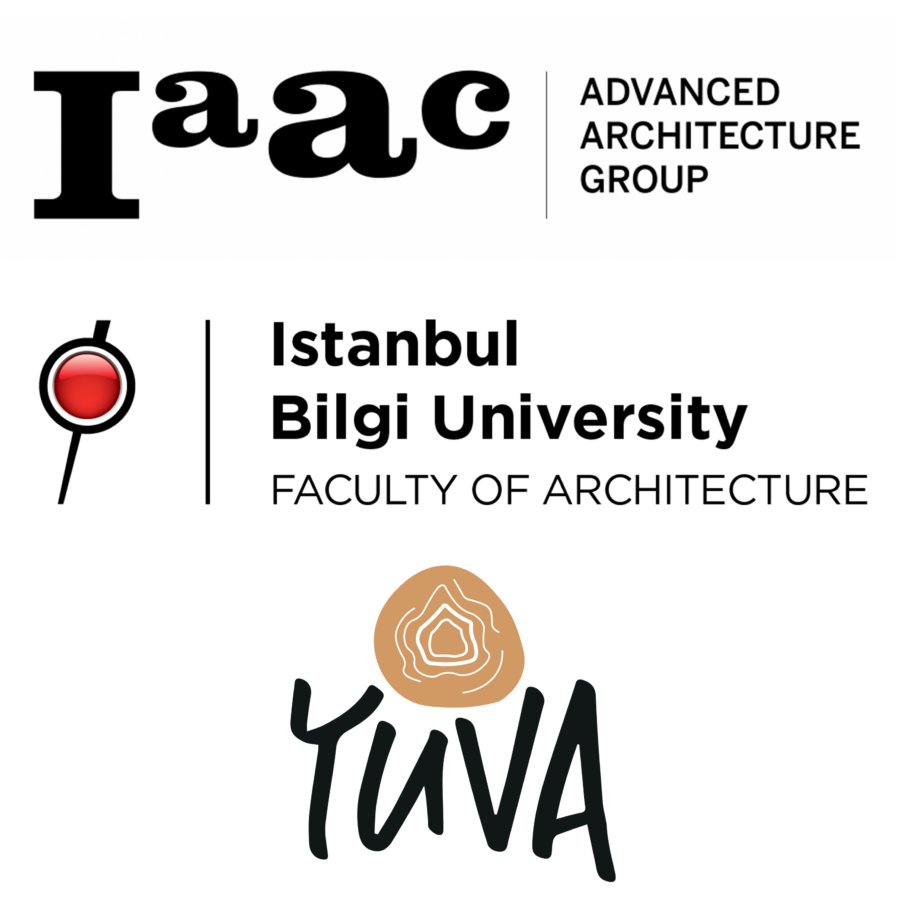DIGITAL CRAFTING: ROBOTIC FABRICATION FOR EMERGENCY SHELTER
DESCRIPTION
IAAC Summer School 2025 at Bilgi University in Istanbul will focus on exploring the potential of robotic fabrication techniques combined with wood as a sustainable and versatile construction material. In a world increasingly affected by natural disasters, the need for fast, efficient, and adaptable shelter solutions has never been greater. This year’s program challenges participants to design and fabricate rapidly deployable emergency shelters that can respond to the urgent needs of displaced communities following events such as earthquakes, floods, and other natural catastrophes.
Through a series of hands-on workshops, lectures, and collaborative studio work, students will gain direct experience in robotic manufacturing processes, digital design methodologies, and the physical behavior of wood in construction. The workshop will emphasize both the conceptual and technical dimensions of emergency architecture, encouraging participants to think critically about material efficiency, assembly logic, modularity, transportability, and environmental impact.
This year, the program will also incorporate virtual reality (VR) to support the design and fabrication workflow, enabling participants to engage more intuitively with spatial planning and assembly logic throughout the development process.
By leveraging computational tools, robotic precision, and immersive technologies, participants will prototype innovative solutions that are not only structurally sound and easy to assemble, but also sensitive to the social and emotional needs of affected populations. The program fosters a multidisciplinary environment, bringing together architects, designers, engineers, and makers, all working toward a common goal: rethinking how technology and natural materials can create dignified, resilient spaces for people in times of crisis.
The final outcomes will be presented through physical prototypes and conceptual design proposals, showcasing how advanced digital fabrication and immersive design tools can contribute to more humane and responsive shelter systems in the face of global challenges.
RESULTS OF PREVIOUS EDITION
STRUCTURE
Phase 1 (7th – 11th of July) – The first week focuses on exploring design strategies, understanding material behavior, and developing digital workflows. Participants will form teams, generate design proposals, and test initial ideas through small-scale experiments.
Phase 2 (14th – 18th of July ) – In the second week, participants move into the prototyping and fabrication stage. Designs developed in the first phase will be adjusted and improved through hands-on making, material testing, and robotic fabrication. The process will lead to the construction of a full-scale prototype that brings together the most effective ideas into one cohesive outcome.
*Detailed schedule will be provided closer to the workshop date.
LEARNING OBJECTIVES
By the end of the summer school, participants will:
- Explore emergency shelter design
Understand the social, environmental, and technical challenges of designing for crisis contexts and displaced communities. - Work with wood as a responsive material
Investigate the structural behavior, joinery logic, and sustainable potential of wood in rapid construction scenarios. - Learn robotic fabrication workflows
Gain practical skills in robotic manufacturing, including toolpath generation, machine operation, and precision assembly. - Integrate virtual and physical design
Use virtual reality as a tool for spatial testing, assembly simulation, and iterative design development. - Prototype at full scale
Translate digital concepts into tangible outcomes through collaborative design and hands-on prototyping.
Participants will gain an official IAAC Global Summer School certificate upon completion of the program.
TUTORS

Şebnem Yalınay Çinici (Prof.)
Dean of Faculty of Architecture at İstanbul Bilgi University
Şebnem Yalınay Çinici (Prof. Dr.) received her B.Arch (1989), M.Arch (1991, in Architectural Design), and Ph.D. (1999, in Architectural Design) degrees from the Department of Architecture at Middle East Technical University (METU). She completed her postdoctoral studies (2001) at the Graduate School of Architecture, Planning, and Preservation at Columbia University. She began her academic career at METU, Department of Architecture (1991-2006), and later continued at Yıldız Technical University, Department of Architecture (2006-2011).
During the 2022-2023 academic year, she took a sabbatical leave and was invited to teach in the First Year Studios at Pennsylvania State University’s Department of Architecture, where she is currently a member of the Immersive Environment Lab Research Team.
As a co-founder of the Department of Architecture (2009) and the Computation-Based_BasicDesignStudio@BİLGİ (which offers an alternative approach to first-year design education), Şebnem Yalınay Çinici continues her academic career at Istanbul Bilgi University. From 2011 to 2020, she served as the founding Head of the Architecture Department.

Tuğrul Yazar (Prof.)
Tuğrul Yazar (Prof.) graduated from Yıldız Technical University’s Faculty of Architecture in 2001. Following this, he obtained his Master’s degree in Computer-Aided Architecture in 2003 and completed his doctoral studies in 2009 at the same university. With a focus on architectural education and digital design, Tuğrul Yazar has been instructing courses in Architectural Geometry, Design Computation, Design Mathematics, and Parametric Design at Istanbul Bilgi University’s Faculty of Architecture since 2011. Achieving the title of Associate Professor in 2016 and Professor in 2021, Yazar has actively contributed as a principal investigator and researcher in scientific projects funded by TÜBİTAK, YTÜ, and İBÜ. His scholarly contributions encompass articles, conference papers, and peer reviews covering topics such as architectural geometry, computational design, and architectural pedagogy. Beyond academia, Yazar engages in consultancy services and workshop leadership for architectural projects, alongside exhibiting his works in diverse exhibitions and biennials.

Fulya Özsel Akipek (Assoc.Prof)
Fulya Özsel Akipek completed her master’s and doctoral studies in the Computer-Aided Architecture Program at Y.T.U. Since 2012, she has been a faculty member in the Department of Architecture at Istanbul Bilgi University, where she has also held various administrative positions.
In 2016, she co-founded Potplus, a design-research collective with Tuğrul Yazar, where they collaborate with consultants from various disciplines to engage in collective production. Their full-scale prototypes created for public spaces have been exhibited at various international art and architecture biennials, received awards, and have been published in academic platforms. From 2020 to 2023, she led an interdisciplinary research project titled BIRE-PAN (Biologically Improved Rammed Earth Panels and Blocks), supported by the Istanbul Bilgi University Research Development Innovation program. The project was realized as a prototype space application in collaboration with the industry at the Fibrobeton Düzce Factory’s Open R&D site.
Fulya Özsel Akipek currently serves as an Associate Professor at Istanbul Bilgi University and has been the Chair of the Department of Architecture since November 2023.

Deniz Tümerdem (Assit.Prof)
Graduated from IAAC, Coordinator of GSS Istanbul at 2013
Deniz Tümerdem is a Ph.D. architect, landscape architect, and bio-based materials designer. She earned her bachelor’s degree in architecture and landscape architecture from Istanbul Technical University in 2010. In 2012, she completed her Master’s in Advanced Architecture at the Institute for Advanced Architecture of Catalonia (IAAC), focusing on Digital Tectonics. In 2013, she contributed as a tutor to the IAAC Global Summer School’s Istanbul node. She obtained her Ph.D. in Architectural Design Computing from Istanbul Technical University, where her research centered on material-based design and bio-based material research. Currently, she is a faculty member in the Department of Architecture at Istanbul Bilgi University. She also co-founded Epitome, a collaborative network dedicated to interdisciplinary design research and practice.

Gamze Gündüz (Assit.Prof)
Graduated from IAAC, Coordinator of GSS Istanbul at 2013
Gamze Gündüz is an architect who graduated from Yıldız Technical University’s Department of Architecture in 2010. After gaining experience in various design studios, she pursued an M.Arch degree at the Digital Tectonics Studio of IaaC (Institute for Advanced Architecture of Catalonia), where she also participated in the Open Thesis Fabrication Program. In 2024, she completed her Ph.D. at Istanbul Technical University in the Architectural Design Computing Program. Currently, she is an Associate Professor at Bilgi University, where she teaches courses in the 1st-year basic design studio, design geometry, design computing, and electives focused on interactive systems, digital and robotic fabrication techniques, and their integration into design processes. In addition to her academic work, she has participated in several international and national exhibitions, including the 4th İstanbul Design Biennale. She is also the co-founder of Epitome {Collaborative Network}, a multidisciplinary platform that creates interactive installations. The platform’s work has been showcased in temporary exhibitions such as Istanbul Modern and Contemporary Istanbul (Plug-In). Her research interests center on computation-based design, design education, composite material studies, and exploring ways to integrate traditional materials with contemporary digital fabrication technologies, including robotic clay printing.

Yiğitalp Behram
IAAC Alumni
Yiğitalp Behram is an architect specializing in computational design, robotic fabrication, and digital production techniques. His work integrates algorithmic design, material research, and automation to redefine architectural fabrication and construction processes.
As a co-founder of Rolab Studio, Behram focuses on robotic 3D printing, material optimization, and digital fabrication strategies. His work explores additive manufacturing techniques, custom material formulations, and automation in construction, pushing the boundaries of conventional building methods. He has contributed to projects that integrate computational workflows with robotic systems, enhancing efficiency and precision in architectural production. Behram has been involved in award-winning projects, including large-scale architectural competitions and international exhibitions, where he played a key role in computational and robotic fabrication strategies.

Hazal Yilmaz
IAAC Alumni Ambassador
Hazal Yilmaz is a designer with a focus on the generative aspects of computational innovation through robotic fabrication. She completed her bachelors degree at Istanbul Bilgi University and earned a masters degree in Robotics and Advanced Construction from the Institute for Advanced Architecture of Catalonia.
From 2020 to 2022, Hazal led a seminar on robotic fabrication and large-scale additive manufacturing with clay at Istanbul Bilgi University, while also working as a part-time instructor in the Computation-based Basic Design studio. Additionally, she co-founded RolabStudio. Currently, she is a researcher specializing in Robotic Additive Manufacturing at La Máquina in Barcelona.

Meryem N. Yabanigül (M.Arch)
Meryem N. Yabanigul is an architect, graduated from Istanbul Bilgi University, Department of Architecture in 2015. She holds an M.A. degree from Istanbul Bilgi University and worked on fabricating a double-curved mathematical surface with robotic hot-wire cutting method. Now she is working as a Lecturer at Istanbul Bilgi University while pursuing a Ph.D. degree at Istanbul Technical University, Computational Design Program. She continues to develop knowledge in computational design, robotic fabrication and design cognition with her current research.
LECTURES
LOCATION
SantralIstanbul, opened in 2007, is a dynamic arts and cultural complex located at the upper end of the Golden Horn in Istanbul’s Eyüp district. Housed in a restored historic power plant, it is part of Istanbul Bilgi University and offers a unique setting that bridges industrial heritage with contemporary education, design, and creative practice.
REQUIREMENTS
Eligibility
IAAC GSS is open to creative and innovative people who are interested in fields such as architecture, urban planning, digital fabrication, design, etc., searching for a multidisciplinary experience in an international environment. No previous skills are required, although CAD design, programming and digital fabrication skills are welcome. The official language of the course is English.
Credits
After the course, participants will have acquired both theoretical and practical knowledge of advanced design strategies. They will be familiar with parametric software, data visualization techniques, and the use of digital + robotic fabrication tools. On the final day, participants will present their developed projects to a distinguished jury and receive a Global Summer School diploma.
Visa
Each participant is responsible to investigate which documents are required via the embassies in their country of origin. The school will provide a confirmation letter regarding the participation to the course, and will assist the visa process wherever is possible.
Fee
Fee for Turkey node: 350€
This fee includes all material costs required for the course. No additional registration fee is necessary. Please note that flight tickets, accommodation, and meals are not included in the fee.
APPLICATIONS
GSS25 Turkey node welcomes curious and motivated individuals who are excited to engage with emerging technologies. No CV, portfolio, or academic certifications are needed.
How to apply:
-
Complete the registration form below.
-
You will receive an email from the Turkey Node coordinator with payment details.
-
Your participation will be secured once the payment has been processed.
GSS25 dates are 7th – 18th of July 2025 and applications are open until 20th of June 2025.
For more information email: [email protected]
IN COLLABORATION WITH:



